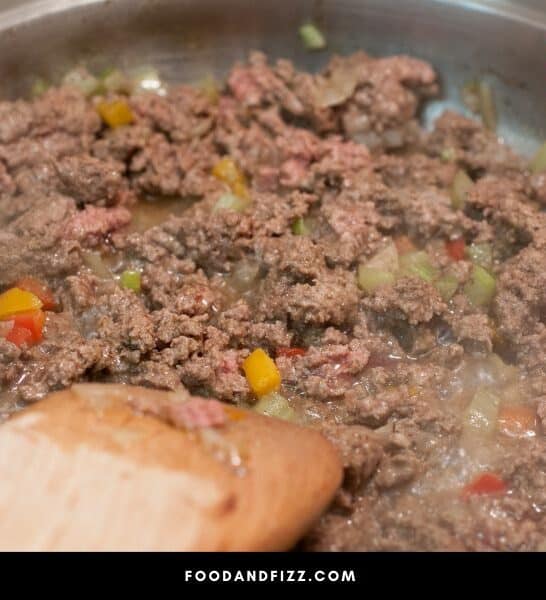Ground beef grease is the liquefied fat extracted from cooking the meat at high temperatures. Ground beef comprises both steak and animal fat. Thus when heated during cooking, the fat melts.
Although the grease is liquefied when hot, it begins to solidify the ones left at room temperature, hence forming solid animal fat. Grease has been considered unsuitable for various reasons, which makes some people opt to drain it completely.
Can You Pour Ground Beef Grease Down The Drain?
It is not advisable to pour grease down the drain. That’s because when subjected to cooler temperatures, the fat begins to solidify and become stickier. The stickiness could hold other pieces of solid food getting into the sink. As such, it could lead to the drain’s blockage, creating a hazard in your kitchen. The best way to dispose of grease is to put it in a small container, let it solidify, and then throw it away later.
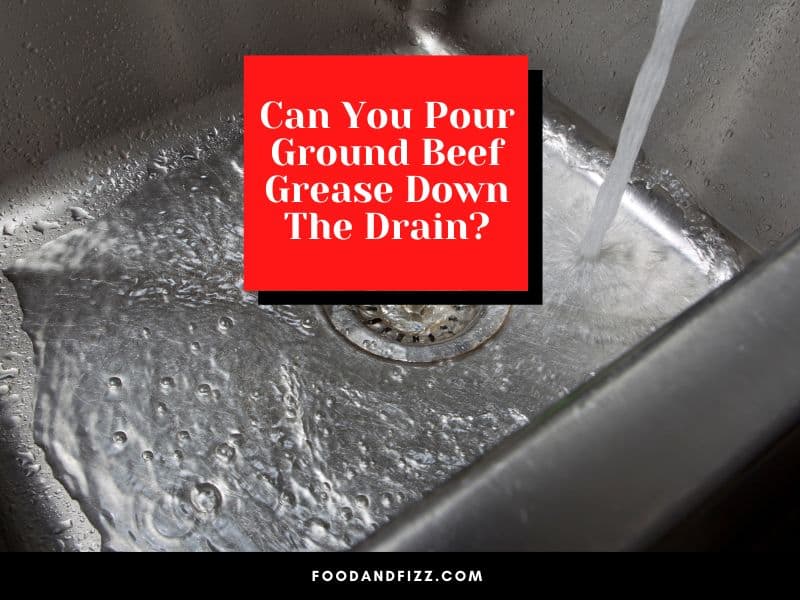
Why Would It Be Dangerous to Pour Grease into Your Drain?
There are several reasons why pouring ground beef grease into the drain isn’t the best option. Some of the most common reasons why the idea is lousy include;
- Clogging: As noted earlier, liquefied animal fat will only remain in that form as long as it is under constant heat. Otherwise, it begins to solidify when the temperatures start to cool. That means it could solidify when still in the pipes, becoming sticky, which holds other food particles leading to clogging.
- Plastic Piping: Most drainage systems, especially pipes, are plastic. If hot liquefied fat is poured on them, it could destroy the pipes.
- Health risks: This is a secondary problem from the clogging effect. When the drain is blocked, waste or dirty water would not get into the sewer and thus could begin to leak. That exposes home users to germs, bacteria, and other microorganisms dangerous to their health.
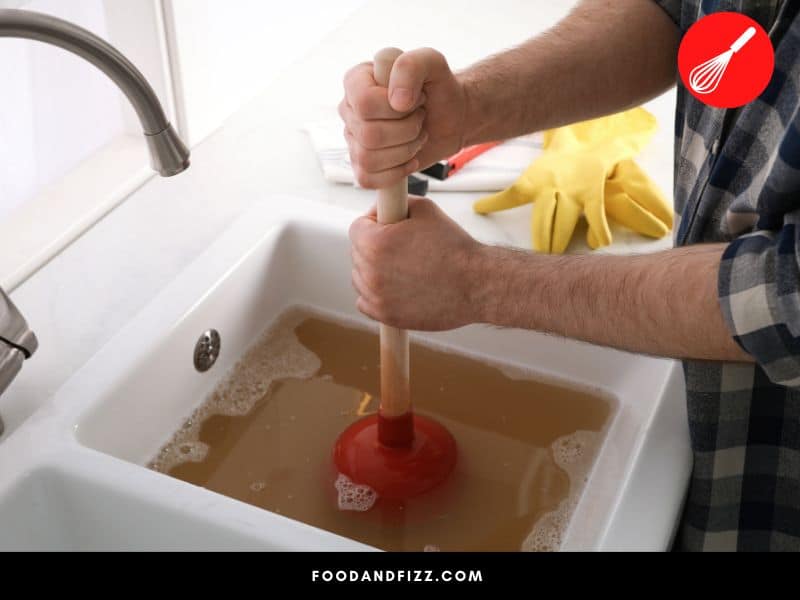
How Do I Drain Grease from Ground Beef?
The process of draining grease from ground beef begins with the cooking of ground beef. That’s the time the melting of animal fat begins to melt.
When the cooking is almost complete, it is easy to trace liquefied fats at the bottom of the cooking pan. Begin by removing the ground beef from the pan while squeezing it using a cooking stick to drain the liquefied oil.
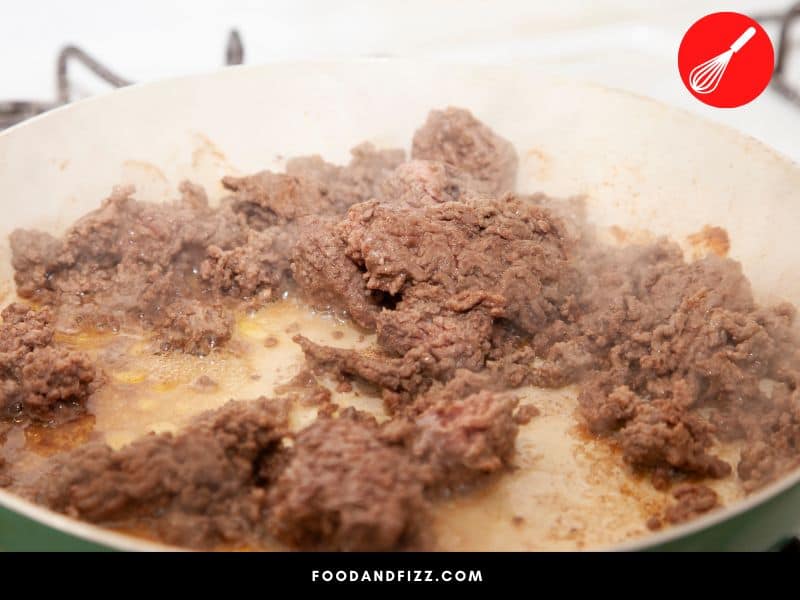
Can I Cook Using Ground Beef Grease?
Ground beef grease is used for cooking purposes. That’s because you can substitute butter or cooking oil with fat. As such, you can use the grease for several cooking processes, such as roasting vegetables, caramelizing onions, or coating a cooking pan to prevent whatever you’re cooking from sticking.
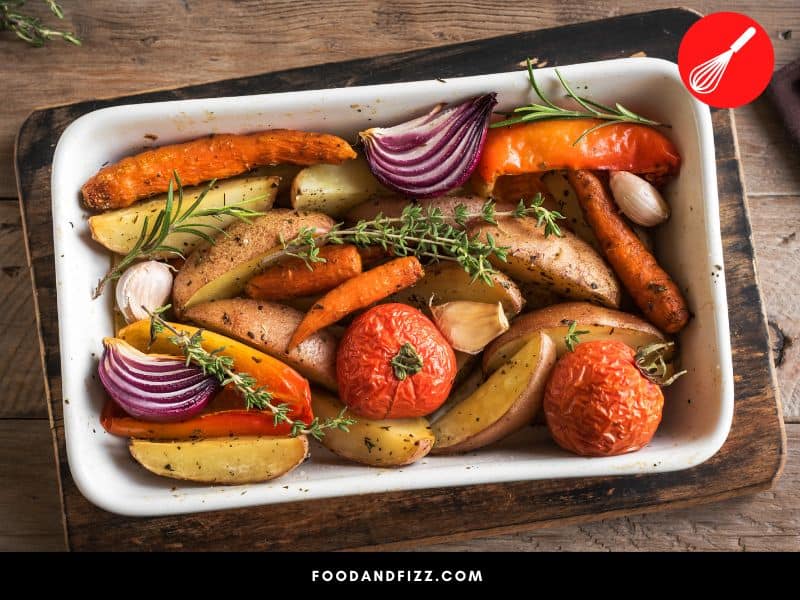
Why Is It Not Advisable to Use Ground Beef Grease?
While using ground beef grease is safe, it has some disadvantages, making it an unlikely choice for most people. Some reasons it is not recommended may be due to preferences, while others may result from the need for good health.
Here are some key reasons why I don’t like and wouldn’t recommend using ground beef grease for cooking other foods.
- Odor: Ground beef grease has a unique smell of beef meat, which might not go well with some of the delicacies you may wish to prepare.
- Cholesterol: The grease contains high cholesterol and saturated fat, which could lead to health challenges.
- Solidification: The grease quickly solidifies, leaving traces of fat solids on the food when it cools down. That destroys the texture of the meal by making it quite uncomfortable to have the delicacy.
- Taste: Ground beef grease has the taste of beef meat. That means its use will influence the flavor of your delicacy. As such, it might not be the best choice if you don’t like the beef taste in certain meals.
- Spoilage: Ground beef grease, in most cases, does not undergo proper preservative techniques. Hence it could quickly spoil. Besides, it contains traces of tiny pieces of meat, which easily attract bacteria. Therefore, it would be wise to be cautious, as cooking with it may lead to bacteria-related infections.
How Can I Tell If Ground Beef Grease Is Spoilt?
Like most edibles, ground beef grease goes bad too. It is essential to avoid spoilt ground beef grease to eliminate any potential food poisoning. Some of the most notable signs that indicate the ground beef grease has gone bad include;
- Molds: The appearance of molds for food items indicates that the edible has begun to spoil, and it’s time to discard it.
- Smell: If the grease begins to give a terrible odor, then you should know the spoilage must commence and throw away. Spoilt fat produces a rotting and sour smell that would be unpleasant.
- Taste: Checking the taste of your ingredients before preparing a meal is an excellent start to knowing whether they are spoilt or not. It is not any different when it comes to grease. If the taste is rancid or feels rotten, do not use the fat but throw it all together.
- Discoloration: If you notice grease discoloration, that’s a good reason to discard it. The appearance of colors such as gray, brown, green, or blue is an indication that the fat has already begun to rot.
- Texture: Another technique you can use to tell whether the grease has spoiled is feeling it with your hand. If a touch feels sticky and slimy, there are higher chances that the fat has been damaged and should be thrown away.
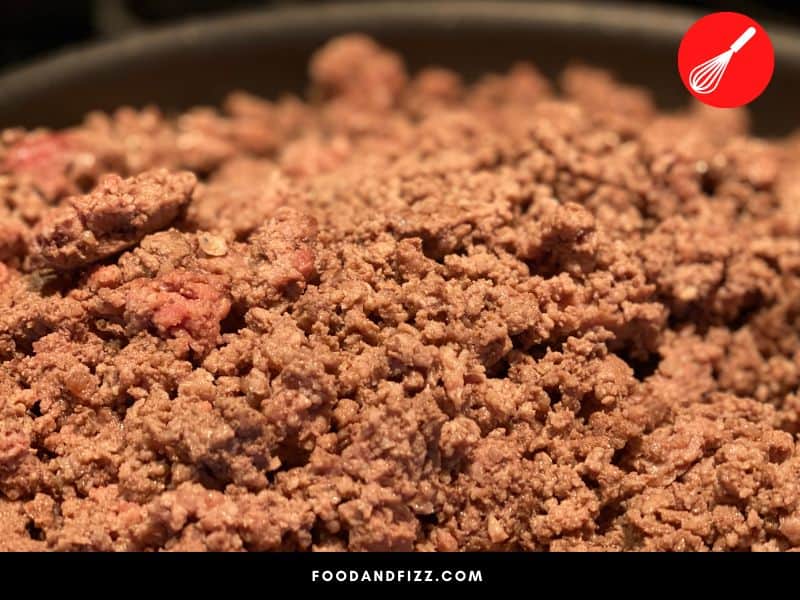
Frequently Asked Questions to Can You Pour Ground Beef Grease Down The Drain?
Is It Okay if I Pour Ground Beef Grease Down the Drain?
It is not advisable to pour ground beef grease or animal meat grease down the drain. That’s because it begins to solidify and becomes stickier, leading to clogging.
What Should I Do if the Drainage is Clogged by Ground Beef Grease?
The best approach to unclogging grease-clogged drainage is to pour boiling water into the drainage. That melts the fat away, thus clearing the drainage.
Can I Reuse Drained Ground Beef Grease?
Drained ground beef grease can be used as a substitute for cooking oil or butter. However, it is less disadvantageous than the two.
Conclusion to Can You Pour Ground Beef Grease Down The Drain?
Ground beef grease should not be poured down the drain as the fat can solidify and cause a blockage in your drain, which can cause a health hazard in your kitchen. The best way to dispose of ground beef grease is to pour it into a small container, let it solidify and throw it away later.

